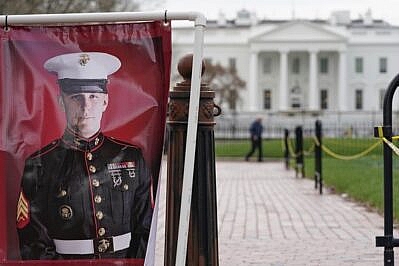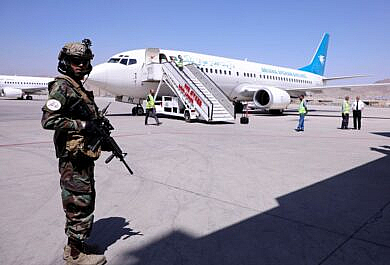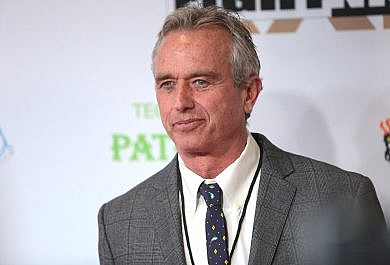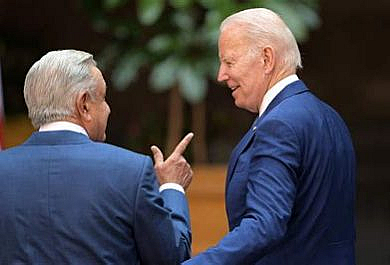Russia freed US Marine Trevor Reed in a hostage swap with the United States.
Summary
Russia freed US Marine veteran Trevor Reed in a hostage swap with the United States.
- The Russian government sentenced Reed to nine years in prison in 2020 after a 2019 arrest for allegedly assaulting two Russian police officers, which Reed denies.
- Reed was freed after three years imprisonment in exchange for convicted Russian drug trafficker Konstantin Yaroshenko, who was serving a 20-year sentence for conspiracy to smuggle cocaine into the US.
- The timing of the exchange is notable, coming amid US efforts to supply Ukraine with billions in arms and aid to fight off Russia’s unprovoked invasion of its neighbor.
- President Joe Biden said in a statement that “the negotiations that allows us to bring Trevor home required difficult decisions that I do not take lightly.”
- The repercussions of Russia’s war on Ukraine continue to reverberate across Europe. Russia cut off gas supplies to Bulgaria and Poland, “taking direct aim at European economies.”
- European leaders assailed the Russian decision to halt energy exports to two NATO countries as “blackmail” and European gas prices skyrocketed in the hours after the announcement.
- Russia blamed mysterious gunfire and explosions in the Moldovan breakaway region of Transnistria on Ukraine, raising concerns that the conflict may expand to Moldova. Russian troops have occupied the small region between Moldova and Ukraine since 1991.
![]()
- The New York Times reported that on the same day of Reed’s release, Russia’s suspension of natural gas to Poland and Bulgaria could reverberate throughout the European economy.
- CNN provided more details on Reed’s imprisonment and growing concerns about his health in recent weeks.
- The Washington Post published an in-depth report on American hostages held abroad in November 2021. Since publication, four Americans – Reed, journalist Danny Fenster in Myanmar, and Gustavo Cardenas and Jorge Alberto Fernandez in Venezuela – have been released. Dozens more remain imprisoned.
![]()
- Fox News had more details on Reed’s health concerns that may have prompted the exchange, as well as details on the exchange itself, which occurred in an undisclosed European country.
- The Washington Examiner’s reporting included details about Reed’s 2019 arrest as well as other Americans still held by Russia.
- The Wall Street Journal covered the potential economic ramifications of Russia’s stoppage of gas flows to Poland and Bulgaria, “a major escalation in its standoff with Europe.”
Author’s Take
The families of two dozen US hostages wrote an open letter to the Biden Administration in October 2021 calling for Biden to step up his efforts to bring Americans home and saying they felt “kept in the dark about what the US government intends to do to free our loved ones.” The family of Austin Tice, who has been held hostage in Syria since 2012, said “the US government is their biggest obstacle in bringing their son home.”
The current US Special Presidential Envoy for Hostage Affairs, Roger Carstens, was initially appointed by former President Donald Trump. Trump made freeing American hostages a top priority. Fifty Americans held in 22 countries were freed during his tenure. According to the James W. Foley Legacy Foundation, 60 Americans are being held hostage or wrongfully detained abroad. The Foley Foundation was established in honor of Jim Foley, an American freelance journalist who was kidnapped and murdered by the Islamic State in Iraq and Syria in 2014.
Hopefully Reed’s release is a sign the Biden administration is listening to these families. Reed was not the only American hostage held by Putin’s Russia. Paul Whelan, an American businessman, was arrested on evidence-free charges of spying in 2018 and is serving a 16-year prison sentence. WBNA star Brittney Griner was detained in Russia two months ago and little information has been made public about her case.
In 1904, American businessman Ion Perdicaris was kidnapped by Moroccan warlord Sherif Raisul, who demanded a ransom and control of vast swaths of Morocco. In response, President Theodore Roosevelt sent seven warships and a contingent of US Marines and issued an ultimatum: “This Government wants Perdicaris alive or Raisuli dead.” Within two months, the humiliated and impotent Moroccan government was forced to pay the ransom and Perdicaris was freed. The days of sending American warships to free hostages are long gone, but the work of bringing Americans home from foreign prisons is never over.
© Dominic Moore, 2022






